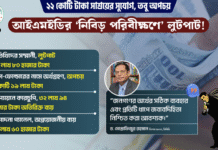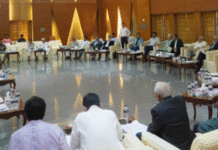Ensure rule of law instead of denial
Bangladesh has done poorly in the recent rule of law index, drawn up by the US-based World Justice Project. The matter is disturbing, but the ruling party is unwilling to accept the facts. And this denial of the truth is further deteriorating the rule of law.
It has become customary for our governments to trumpet the findings of any index from any organisation home or abroad if it goes in their favour, and downplay or even criticise it if it goes against them. Unfortunately, law minister Anisul Huq is no exception.
Bangladesh has always cut a sorry figure when it comes to the rule of law, human rights or economic discipline. Although our ruling class boasts that Bangladesh is a role model of development, reality is different. Our government policymakers fail to understand that they can fool some people some of the time, but cannot fool all people all of the time.
According to WJP, last year Bangladesh ranked 102th out of 113 countries in the rule of law index. A total of 101 countries did better than us, while only 11 countries were below us. In this year’s index, Bangladesh was placed 112th out of 126 countries. Denmark, Norway and Finland topped the list while Afghanistan, Cambodia and Venezuela bottomed the list.
It worries us that Bangladesh was 4th among the 8 South Asian countries. India, Nepal and Sri Lanka were better positioned than us.
WJP Rule of Law Index measures adherence to factors such as constraints on government power, absence of corruption, open government, fundamental rights, law and order, regulatory enforcement, civil and criminal justice. Bangladesh’s policymakers never paid attention to those integral elements of rule of law. It is unfortunate to see that the same person who was vocal about rule of law while in the opposition party has shown utmost indifference to those very same issues after ascending to power.
Deterioration in our fundamental rights and safety index also worries us. Although the people are experiencing this decline in their everyday day life, it is seldom reflected in the surveys conducted by international organisations.
Law minister Anisul Huq termed the WJP survey as partial. It is not clear on what basis he made that claim. While allowing the opposition parties to carry out peaceful demonstrations and ensuring freedom of press is an integral prerequisite for establishing fundamental rights, unfortunately these two basic rights had been severely lacking of late.
In that sense, keeping Bangladesh ahead of Sri Lanka and Nepal in terms of rule of law is a travesty of truth. The incarceration of innocent Jaha Alam for three years or the assault on women and children for seeking justice has pinpointed the frail state of our justice system.
Therefore, make sure that rule of law is ensured instead of denying the truth. Take effective and sustainable measures for establishing rule of law by removing direct and indirect obstacles on its way.
Thus, Bangladesh would not neither be condemned for poor performance in terms of rule of law or the minister would not need to protest the outcome of any international index.









